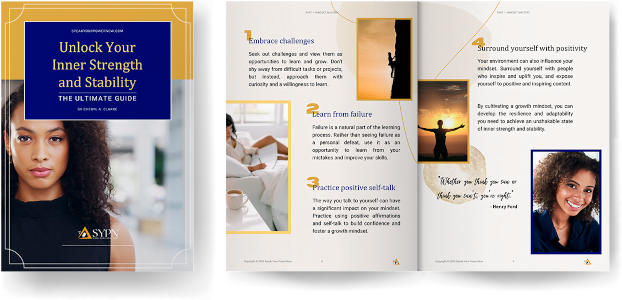In the ever-evolving landscape of my professional world, the importance of emotional intelligence (EQ) cannot be overstated. Emotional intelligence is the ability to recognize, understand, manage, and use our emotions effectively in social interactions. It’s a skill that has a profound impact on our career and workplace, influencing our relationships, leadership abilities, and overall success. In Episode #11 of the Speak Your Power Now Podcast, I delved deep into this transformative topic, shedding light on how EQ can be harnessed to empower anyone and change the dynamics in the workplace.
Understanding the Foundation for Emotional Intelligence
At the core of emotional intelligence lies self-awareness, empathy, and relationship management. Self-awareness involves understanding our own emotions and recognizing how they affect our interactions with colleagues and team members. It’s about leaving personal issues at the door when we step into the workplace, ensuring that our emotional baggage doesn’t disrupt the harmony and productivity of our teams.
Imagine walking into the office after a heated argument with a loved one. If you bring that emotional turmoil into the workplace, it can manifest as irritability, poor concentration, and strained interactions with coworkers. That’s where self-awareness comes into play. Being in control of your emotions and understanding their impact on your professional life is essential for creating a harmonious work environment.
I’ve discovered that by leaving personal issues behind and focusing on the task at hand when I enter my workspace, I can create a more productive and positive environment. Self-awareness has been a game-changer in my professional life.
Building High-Performance Teams with EQ
In the modern workplace, collaboration is often the key to success. Whether you’re part of a team or a leader, emotional intelligence can foster collaboration, trust, and synergy among team members. I discussed real-world examples of CEOs like Jeff Bezos, Howard Schultz, Oprah Winfrey, and others who have skillfully applied EQ to connect with their teams and customers.
For instance, Jeff Bezos of Amazon is known for his obsession with understanding the hearts and minds of his customers. By taking a long-term perspective and focusing on the customer experience, he’s been able to build a thriving business empire. Similarly, Howard Schultz of Starbucks took the time to understand the cultural nuances of his employees and customers in China. By valuing family, honor, and generations, he tailored his approach to align with Chinese values.
These CEOs understand the emotional thermostat of their target audience and create connections based on empathy, respect, and genuine concern for their customers and employees. Emotional intelligence, in their case, has been a game-changer.
Navigating Conflict and Challenges
Conflict in the workplace is inevitable. Emotions often run high during such times, and logic can take a back seat. Developing emotional intelligence equips you to navigate conflicts effectively, making you an asset in any work environment.
I emphasize that these conflict-resolution skills are not limited to leaders; anyone can benefit from them. By practicing active listening, empathy, and conflict resolution, you can manage conflicts in a way that leads to positive outcomes. It’s not about avoiding conflicts but rather addressing them with emotional intelligence.
Living Authentically and Aligning Values
Living authentically means aligning your values with your emotions and managing them in a way that respects others. Authenticity goes beyond just technical skills or IQ; it’s about how you connect with others and lead with your true self. I believe in the power of authenticity and how it can positively impact someone’s professional life.
When you live authentically, you respect your own values and the values of those around you. I’ve learned to manage my emotions in a way that respects others. For instance, I used to be the type of person who would readily confront someone. However, I learned that this behavior was a result of my own values and personal issues. Recognizing this, I shifted my approach to align more authentically with my true self and my values.
In the workplace, authenticity is about creating a harmonious and productive environment where personal values are acknowledged and respected. This kind of environment fosters collaboration and empowers individuals to connect on a deeper level.
Conclusion: The Power of Emotional Intelligence
Emotional intelligence isn’t just about professional success; it’s a life skill that can empower us to connect, lead, and succeed in all aspects of our lives. It’s about understanding our emotions, managing them effectively, and using that knowledge to build relationships, lead teams, and navigate conflicts.
Your journey begins with a single step, and embracing emotional intelligence is a powerful step toward empowerment. It’s about making the workplace a space where emotions are understood, managed, and harnessed to create a positive and productive environment. So, whether you’re a leader, a team member, or an entrepreneur, the journey to mastering emotional intelligence is one that will transform your career and empower your authentic leadership.
Call to Action:
- Listen to Episode #11 of the Speak Your Power Now podcast for a deeper understanding of emotional intelligence and its impact on your career.
- Start applying emotional intelligence to your professional and personal life. Reflect on your emotions, practice empathy, and embrace authenticity.
- Share your own stories and experiences related to emotional intelligence in the workplace, and join the conversation about building a more emotionally intelligent and harmonious work environment on our Facebook Group.












